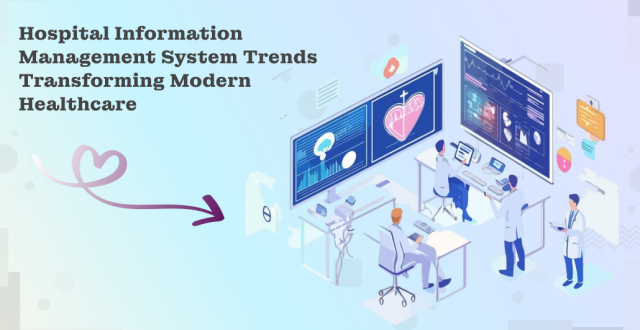Hospital Information Management System trends are transforming modern healthcare with effective operation, enhanced accuracy of information, and enhanced patient care. Enhanced digital adoption by hospitals sees them embracing the hospital management information system as comprehensive clinical, financial, and administrative operation management. Need for the best HMIS software in India only widens as healthcare providers need to lookout for efficiency, regulation, and patient-centered care through enhanced Hospital Management Information Systems in healthcare.
Understanding of Hospital Information Management System
Hospital Information Management System (HIMS) is an end-to-end, chain-wide system that controls the hospital's operating, financial, administrative, and clinical functions. HIMS helps healthcare organizations automate, reduce errors, and deliver improved patient care. With improved delivery of care becoming more crucial, Hospital Management Information Systems in Healthcare are becoming an imperative for hospitals and clinics of every size.
Utilization of AI in Hospital Information Management Systems has also revolutionized the industry by enabling predictive analytics, personalized treatment recommendations, and automating mundane work. These AI systems improve patient decision-making and outcomes by a sheer order of magnitude.
Recent history has seen huge expansion in the application of HMIS in India following the pressure brought about by government policies and technological innovations compelling the industry to embrace. Most HMIS software vendors in India are offering customized solutions for smaller and bigger hospitals, facilitating data-driven healthcare and accessibility. All these technologies are transforming the management of healthcare in India.
Digital Transformation in Healthcare
Medical Revolution in the virtual world is revolutionizing the operations of hospitals and medical centers with focus today on efficiency, accuracy, and patient-centric services. The heart of the revolution is the hospital management information system which consolidates scattered departments—clinical, admin, and finance—on one online platform. The systems automate routine hospital functions like patient registration, scheduling, billing, and inventory, thus eradicating the majority of human errors and delays in work.
Among the most influential innovations is Hospital Information Management Systems with AI. AI enhances the strength of HMIS to provide predictive analytics, automated diagnosis, and real-time decision-making capabilities. AI leads to faster accurate diagnosis, better patient care, and effective resource management.
With Hospital Management Information Systems in Healthcare growing ever more expansive, Indian hospitals are quickly embracing such technologies to meet growing health care demands. This has in turn fueled the demand for some providers keen on offering the best HMIS Software in India, all with scalability, data security, compliance, and usability features.
On a broad level, technology-emergent digital transformation underpinned by intelligent HMIS platforms is enabling health care providers to deliver quality, cost-effective, and cost-saving services and setting up the foundations for an integrated data-driven health care future.
Key Trends in Hospital Information Management Systems
Hospital Management Information Systems in Healthcare are being driven by technological advancements and the demand for efficient patient care. Some of the largest trends shaping the future of HMIS Software are:
Integration with Artificial Intelligence and Machine Learning :
Application of Artificial Intelligence in Hospital Information Management Systems facilitates predictive analytics, real-time alerting, and decision support systems. Artificial Intelligence is useful in diagnosis, prediction of patient admission level, and customized treatment protocols.
Cloud-Based Deployment :
Hospital software is moving to the cloud, providing scalability, security, and cost-effective solutions. Cloud-based designs provide remote access to data and simplicity in maintaining software and updates.
Interoperability and Data Sharing :
Simple integration with other healthcare systems like EMRs, laboratories, and pharmacies provides simple data sharing, a crucial need for coordinated and integrated care.
mHealth Integration and Mobile Access :
Physicians and staff can now access the hospital management system on mobile apps, enhancing access time and patient treatment mobility.
Transformed Cybersecurity :
Highly computationally intensive data such as sensitive patient data being digitized, HMIS systems of today are more concerned with data encryption, access control, and healthcare compliance policies.
Customized and Scalable Platforms :
Acute care hospitals want adaptable HMIS systems that are suitable for their specialty and size, therefore making adaptability a differentiator between providers.
Adoption of Challenges
Although Hospital Management Information Systems in Healthcare are of enormous potential, there are quite a lot of issues to be encountered with their large-scale implementation, the most important among these in the third world being that it is extremely costly to implement, and this is one of the major concerns. Small and medium-sized healthcare facilities are not paying for hospital management software due to sheer expense concerns even if they would think about long-term benefits.
Resistance to change is also a major hindrance. It is difficult to make paperless processes over traditional paperwork, where a lot of training and change management must be enforced. It is also difficult to make it interoperable with legacy systems, thereby hindering proper data migration.
Implementation of AI in Hospital Information Management Systems also has with it its own challenges, i.e., demanding high-quality inputs and advanced technical infrastructures. Without good inputs of data, applications of AI are bound to produce fake outputs, affecting patient care.
Data privacy and security are also a list of challenges here. When the patient information is being computerized, then healthcare centers must follow data protection rules, thus security concerns are the order of the day.
In spite of such issues, digital solution demand is extremely acute, and that is driving innovation among leading HMIS software vendors in India. Vendors today strive to provide inexpensive, scalable, and intuitive platforms addressing issues for small, medium, and large-sized hospitals, eliminating step-by-step complexity of adoption and accelerating digital health transformation at a faster pace.
Conclusion:
Hospital Information Management Systems' future trends are converting healthcare into a next-generation level of operational effectiveness, evidence-based decision-making, and better patient outcomes. With technologies like AI, cloud computing, and mobility, hospitals are getting smarter and networked. As providers increasingly go towards their implementation, Hospital Management Information Systems in Healthcare will increasingly shape the future of healthcare delivery in India and across the world.






